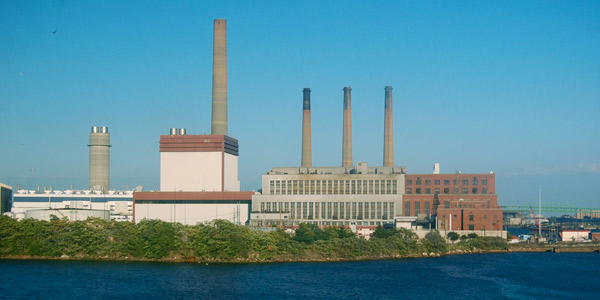By Michael Kuser
FERC on Friday rejected Tariff revisions filed jointly by ISO-NE and the New England Power Pool to clarify that resources retained for fuel security reasons will not be retained for other reasons once the fuel security retention period ends (ER20-89).
“While we favor limiting the scope and length of out-of-market actions, we seek to balance that objective against the ability to address reliability concerns,” the commission said. “The proposal here would remove ISO-NE’s ability to retain a fuel security resource to address potential future transmission reliability issues that may arise simply because the resource in question had been retained previously for fuel security.”
The proposed Tariff revisions prompted a protest from Exelon, which owns Mystic 8 and 9, the planned retirement of which prompted the RTO and NEPOOL to seek to retain resources for regional fuel security in the first place.
Exelon argued that the proposal “unduly discriminates” against fuel security resources in general and the Mystic units in particular. The company contended that “the proposal results in different treatment for transmission security resources based on whether the resource has previously provided fuel security service, despite the fact that transmission security and fuel security resources are similarly situated for purposes of retirement,” FERC noted.
The company further argued that if ISO-NE had requested to retain the Mystic units for transmission security rather than fuel security, the Tariff would allow for possible cost-of-service compensation until the transmission reliability need was addressed. However, the fuel security agreement restricted Mystic’s options in a way not faced by other resources, effectively penalizing it for entering into an agreement for fuel security instead of transmission security.
Exelon also pointed to delays in the completion of ISO-NE’s Energy Security Improvements (ESI) initiative. FERC last August granted the RTO a second extension to file the plan, until April 15. The NEPOOL Participants Committee expects to vote on the new fuel security market design at its April 2 meeting.
The RTO’s aspirations to develop a long-term market-based fuel security solution and competitively develop transmission solutions for the Boston area do not constitute substantial evidence that it is just and reasonable to eliminate a reliability safeguard, Exelon said.
In rejecting the revisions, the commission found that “instead of retaining such a resource for transmission security (as it would any other resource that was not previously retained for fuel security), ISO-NE would need to address this issue through either real-time operating procedures, such as shedding load, or through the use of a gap [request for proposals] solicitation.”
FERC said it remains open to ISO-NE and NEPOOL “proposing to revise the relevant reliability review timeline to ensure that resources are not unnecessarily retained when transmission solutions will be in place in time to address identified reliability needs.”
However, the commission did not find just and reasonable “the proposal to make a resource retained for fuel security ineligible to be further retained for transmission reliability purposes.”
FERC last month rejected a related request to roll back the sunset date for a Tariff provision that allows the RTO to retain a resource for fuel security reasons (ER20-645). (See FERC Rejects ISO-NE Fuel Security Sunset Rollback.)




